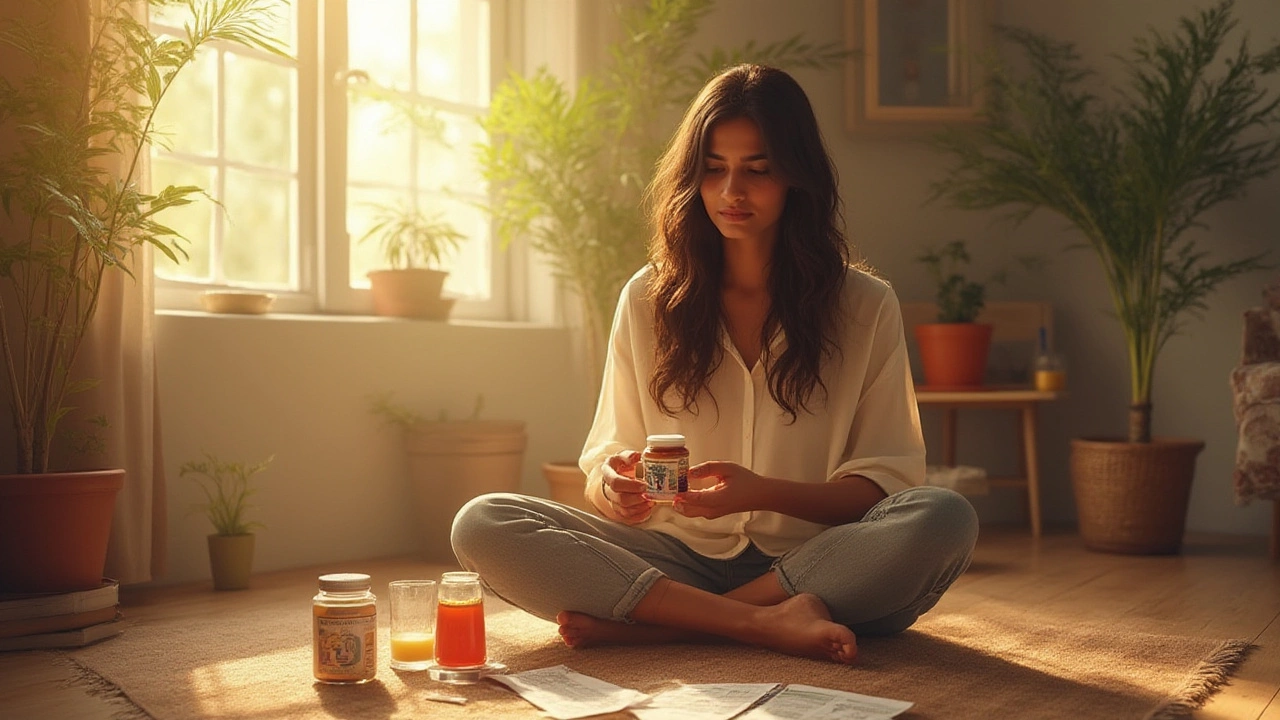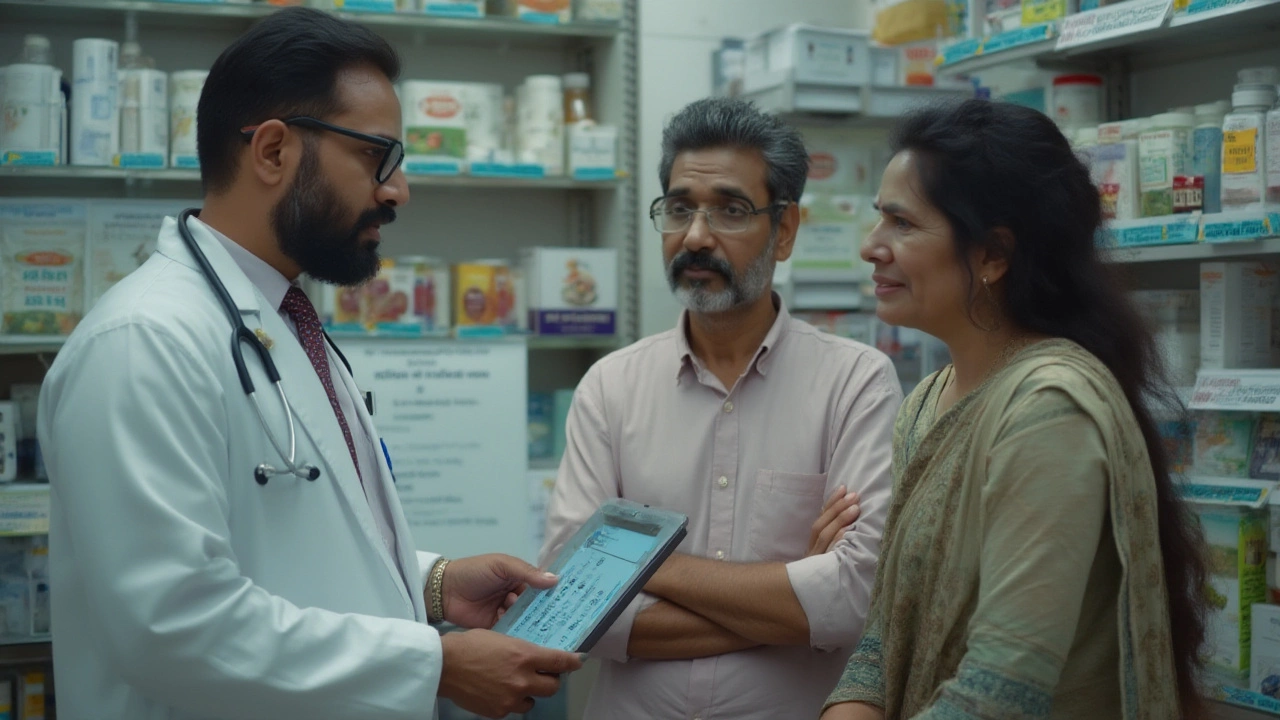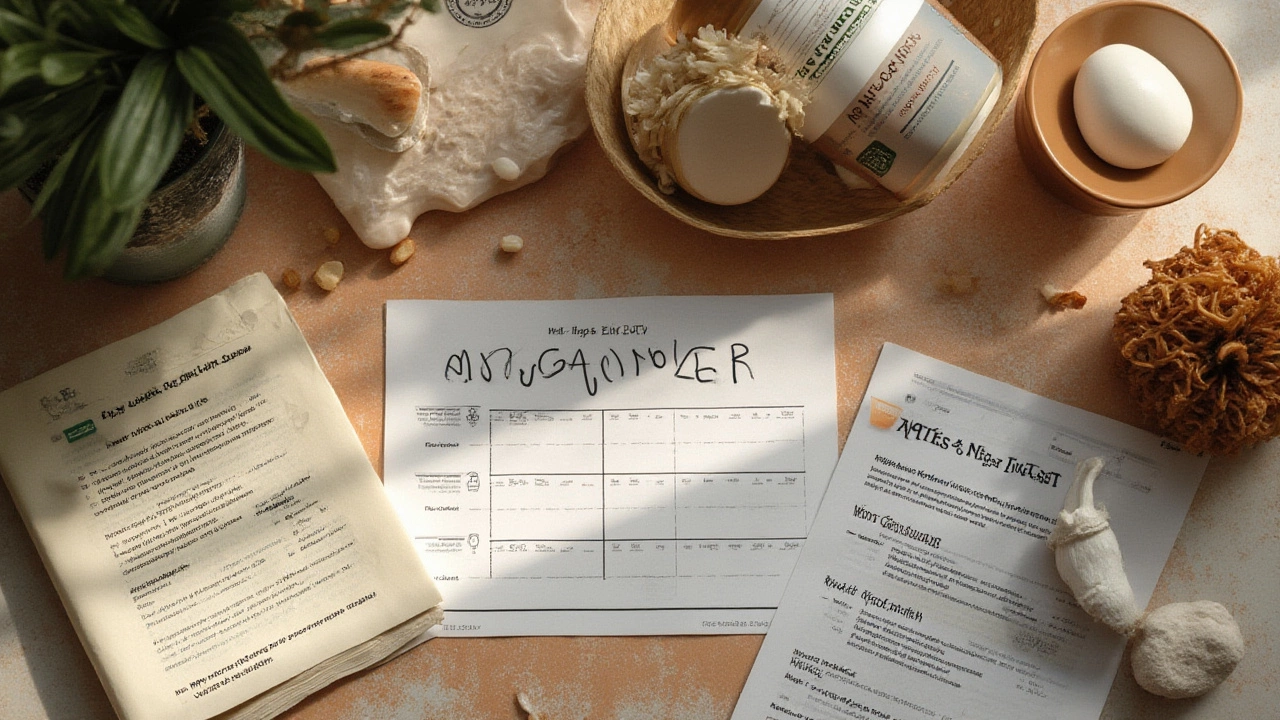Best Over-the-Counter Alternatives to Xanax for Anxiety Relief
 Jul, 17 2025
Jul, 17 2025
Xanax is famous for knocking out anxiety, but it isn’t sold freely in your local pharmacy, at least not in the UK or most places. The hunt for something over the counter (OTC) that’s even half as effective sends millions down the supplement aisle, scrolling long lists of herbal concoctions and pharma-light relaxants. But here’s the real question: What truly works, and what’s simply snake oil? Studies hint that anxiety is on the rise, especially since 2020—with the NHS reporting more than 8 million Brits suffering each year. Not everyone gets access to prescription meds, either because they’re ruled out by doctors, or because the stigma is still alive and well. So, what’s left for the rest of us?
The Reality Behind OTC "Xanax" Replacements
You walk into Boots, scan the shelves, and see names like “Kalms”, “Valerian Root”, “5-HTP”, and “CBD Oil.” Marketing makes it sound like you’ll be blissed-out in no time, but do these actually stand up to the heavyweight punch of prescription Xanax (alprazolam)? The honest answer: nothing you can buy at Tesco or order from Amazon matches Xanax’s rapid and powerful calming effect. Nothing is as quick, and nothing hits that hard. Why? Because Xanax is a benzodiazepine—it targets your GABA receptors (the brain’s “slow down” button), which isn’t something you want to play with lightly.
Most over-the-counter options are way milder, but for some people, that’s exactly what they want. OTC remedies come in a few flavors: herbal supplements, nutritional aids, and “relaxation blends” made for sleep or mild stress. Here’s a fact: Valerian root is one of the oldest herbal remedies known for calming, with actual studies showing it helps some folks fall asleep faster. One study from 2023 (published in the journal CNS Drugs) found that valerian reduced anxiety scores in mild to moderate cases, but didn’t come close to prescription meds for severe nerves. Then there’s magnesium—British Health Foundation data says nearly 11% of adults in the UK don’t get enough through diet, and a few studies connect low magnesium to higher anxiety. If you’re deficient, getting enough might take the edge off.
CBD oil, now filling Instagram feeds and beauty counters, is another buzzword. Trials on CBD for anxiety show mixed results, but a high-quality 2021 review from University College London found that doses above 300mg seemed to blunt social anxiety—far higher than what’s usually in shop-bought tinctures. The bottom line? OTC options *do* help some people, especially for everyday worries, but none are a plug-and-play swap for Xanax. That said, you won’t slide into addiction or grogginess from them, which can’t be said for benzos.

Herbal, Natural, and Store-Bought Anxiety Aids: What's Worth Trying?
If you’re skimming supermarket shelves for fast-acting options, here’s the low-down based on real research—not just marketing claims. First up, valerian root. It’s been tested in multiple randomised controlled trials. Some people report feeling calmer after a week or two, but don’t expect the instant relief of a prescription med. You’ll find valerian in teas, capsules, and tablets—take it in the evening if sleep is part of your anxiety tsunami. Be a bit cautious, though, because valerian can interact with other meds, and long-term safety past a few months isn’t crystal clear.
Then there’s passionflower, another plant-based option. A 2022 double-blind trial in a dental clinic (the true test for anxiety, let’s be real) showed that people who drank passionflower tea before the procedure had lower anxiety scores than placebo. The effect was mild, but not bad for something you can grow on your windowsill.
Magnesium supplements have a decent body of evidence, but mostly for people actually low in magnesium. Massive tablets are unnecessary if your diet is already rich in nuts, leafy veg, and whole grains. If your anxiety comes with twitchy muscles or low mood, magnesium could be a solid first step.
B-complex vitamins, especially B6 and B12, make the rounds on wellness blogs. NHS data suggest deficiency can amp up stress, but unless you’re vegan or have a gut issue, you’re probably not lacking.
CBD oil deserves its own paragraph. UK guidelines allow over-the-counter CBD for “wellbeing,” but not actual medical claims. Some folks swear by it. The trick is that 95% of shop brands contain underdosed CBD and variable purity. Lab-tested drops with 300-600mg per day are where research gets interesting, but these aren’t cheap or easy to dose precisely. Check with your GP before mixing CBD with prescription meds.
If herbs and supplements feel too wishy-washy, some try “relaxation drinks” or “chill out” supplements. They’re usually a mix of the above, tossed together. Read the label, check for weird stuff, and remember that even with “natural” blends, allergies and GI upset can strike.
- Never mix multiple calming supplements without advice—they can interact.
- If you’re on antidepressants or other meds, always check with your pharmacist.
- If your symptoms are severe, last for weeks, or worsen, get real medical help.
Here’s a quick run-down of OTC options and the strength of evidence behind them:
| Option | Evidence Strength | Form | Common Side Effects |
|---|---|---|---|
| Valerian Root | Moderate for mild-moderate anxiety | Capsule, tea, extract | Drowsiness, stomach upset |
| Magnesium | Moderate (if deficient) | Tablet, powder | Loose stools (high dose) |
| CBD Oil | Varies, moderate for social anxiety | Oil, capsule, edible | Dry mouth, drowsiness, drug interactions |
| Passionflower | Weak-moderate | Tea, capsule | Dizziness, confusion (rare) |
| Rescue Remedy (flower essences) | Very weak (mostly placebo) | Liquid, lozenge | None reported |

Making Your Own Calm: DIY Strategies and Lifestyle Tweaks
Sometimes what *really* works doesn’t come in a bottle, but in your own routine. When anxiety flares up, your body flips into fight-or-flight, drenching you in adrenaline. The fastest way to hit the brakes? Learn how to short-circuit that response without waiting for an herb to kick in. Breathing deeply—slow, and from your belly—can drop your stress hormone levels in less than a minute. Sounds simple, but most people breathe shallow by default. There are free apps like “Calm” or “Headspace” with guided breathing and meditations, if you need structure.
Movement is a bigger deal than most admit. Oxford researchers found that 20 minutes of brisk walking slashed anxiety and boosted mood in young adults, with effects lasting hours. If the gym is daunting, even a stroll around the block gets your brain’s natural calming chemicals—endorphins—pumping.
If your anxiety links up with bad sleep (very common), build a sleep fortress. That means no caffeine after 2pm, a dark quiet bedroom, and a wind-down ritual. Swapping screens for a book (yes, even a boring one) can help signal to your brain it’s time for bed.
Nutrients matter too. A 2024 survey by King’s College London found that diets high in “ultra-processed” foods predict higher anxiety scores, while meals loaded with fibre, healthy fats, and lean protein seem to buffer the stress response. If you live on crisp sandwiches and takeaways, try trading a few meals a week for salmon, nuts, or spinach. Tiny changes add up over time.
Social support is criminally underrated. Even a ten-minute chat with a mate, partner, or therapist can break the scary feedback loop that makes anxiety worse. There are loads of free or cheap support groups online (look up Anxiety UK or Mind if you’re not sure where to start).
If you want to supercharge your natural anti-anxiety plan, try this mini checklist:
- Spend at least 15 minutes outdoors daily (natural light is a mood booster).
- Work on good sleep—dark, cool room, fixed bedtime.
- Eat real food—aim for five different colors each day (yes, Skittles don’t count).
- Exercise—nothing fancy, just move.
- Connect—call, text, message, or join a group.
- Practice breathing or mindfulness for five minutes.
Over the counter Xanax may not truly exist, but your own toolkit for calm can be surprisingly effective if you’re willing to experiment and keep an open mind. No two brains are exactly alike, and finding your personal blend of support, supplements, and lifestyle tweaks can make all the difference. Remember, if your anxiety is making daily life miserable or interrupts sleep, don’t wait—see your GP, because strong help is out there.